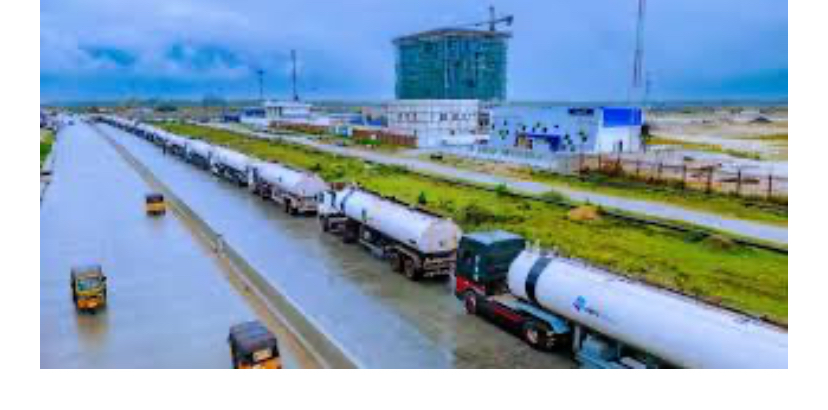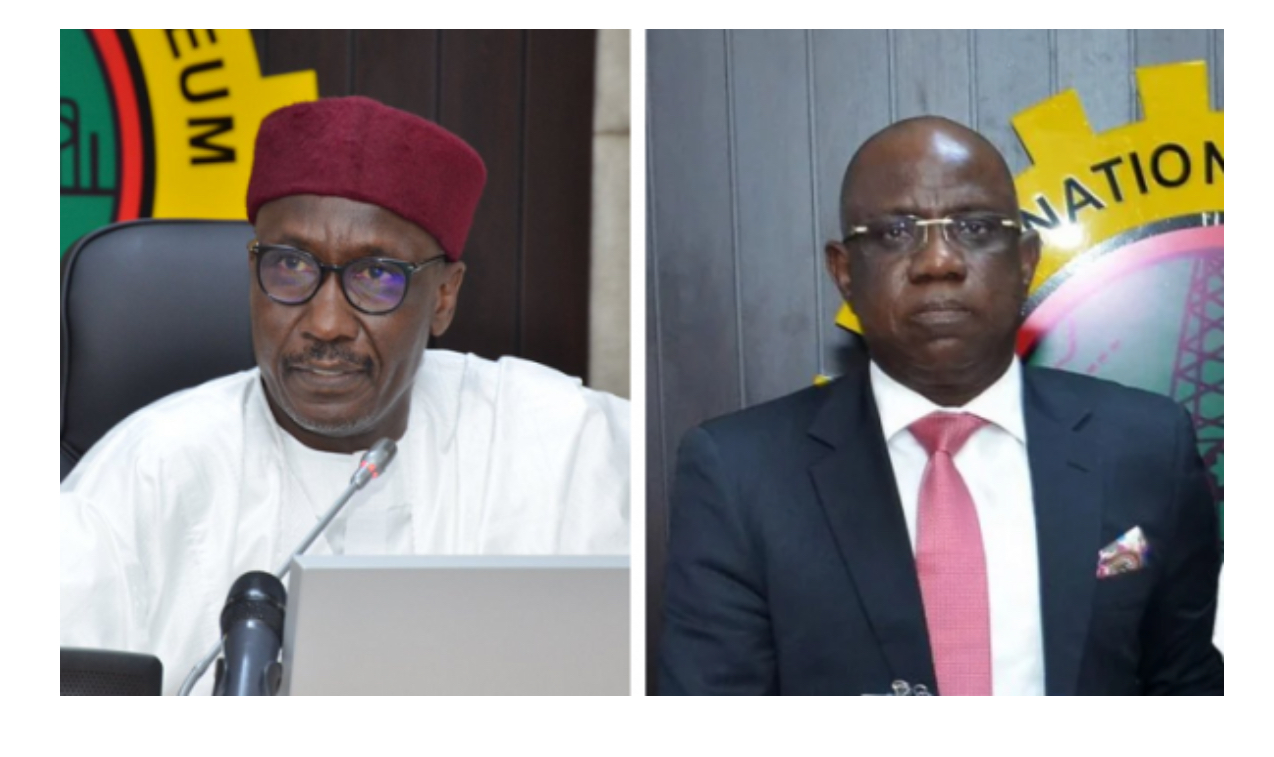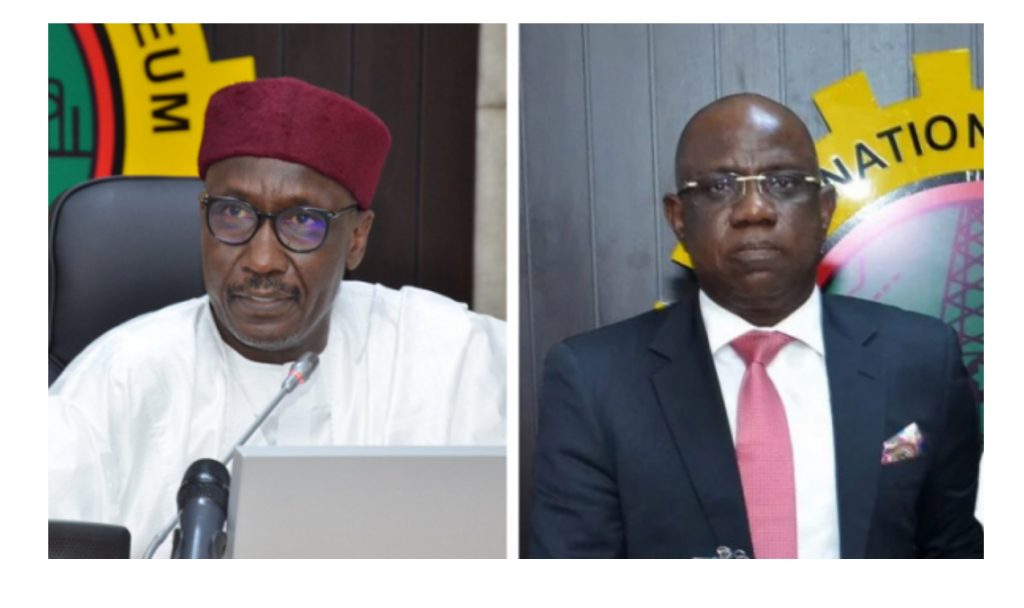news
Breaking : Over 200 NNPC trucks storm Dangote Refinery to commence lifting of petrol

 …Vessel also readied for distribution
…Vessel also readied for distribution
Officials keep mute on price
A long queue of petrol tankers yesterday formed along the stretch of the road leading to the Dangote Refinery at Lekki, Lagos as they slowly made their way into the company’s fuel loading gantry ahead of the commencement of the distribution of Premium Motor Spirit (PMS) today.
Also on standby at the refinery’s loading/discharging facility is a vessel –Binta Saleh- for the same purpose.
The trucks and the vessel belong to the Nigerian National Petroleum Company Limited (NNPCL) which confirmed that it had mobilised over 100 of such vehicles to the refinery by yesterday afternoon in preparation for petrol lifting.
It said: “In preparation for the Dangote Refinery’s scheduled petrol loading on Sunday, September 15, 2024, NNPC Ltd. has been mobilising trucks to the refinery’s fuel loading gantry in Ibeju-Lekki. As of Saturday afternoon, NNPC Ltd. had deployed over 100 trucks, with hundreds more en route.”
Spokesman for NNPCL Femi Soneye in an update on his X handle @FM_Soneye last night said the figure would reach 300 by the end of the day.
“NNPC Ltd. trucks are arriving at the Dangote Refinery in preparation for the scheduled petrol loading on Sunday, September 15, 2024. By the end of today (yesterday), at least 300 trucks will be stationed at the refinery’s fuel loading gantry,” he said.
The NNPCL is the only off-taker of Dangote petrol for now, according to the terms of agreement reached between the company and the refinery.
In effect, interested marketers will be buying the product from the national oil firm.
However, any marketer can buy diesel directly from the refinery.
Under the agreement, the NNPCL will supply about 385,000 barrels of crude oil per day (bpd) to the refinery with effect from next month.
In return, the refinery will supply PMS and diesel of equivalent value to the domestic market, to be paid in naira.
“Diesel will be sold in naira by the Dangote Refinery to any interested off-taker. PMS will only be sold to NNPC, NNPC will then sell to various marketers for now,” Minister of Finance and Coordinating Minister of the Economy,Mr. Wale Edun said on Friday at a press conference in Abuja.
The minister, who was represented by Zach Adedeji, executive chairman of the Federal Inland Revenue Service (FIRS), also said that all associated regulatory costs pertaining to the Nigeria Ports Authority (NPA), Nigerian Maritime Administration and Safety Agency (NIMASA) and others would also be paid for in naira.
“We are also setting up a one-stop shop that will coordinate service provision from all regulatory, and security agencies, and other stakeholders to ensure a smooth implementation of this initiative. This will be located in Nigeria Ports Authority (NPA), Lagos,” Edun said.
He added: “The technical committee that worked to flesh out this initiative will transition to an implementation execution and monitoring committee that will be working out of Lagos for the next three to six months.”
It was gathered that the NNPCL would pay Dangote Refinery in dollar for the PMS until the end of this month because the crude it has been using was imported and paid for in dollar.
Sources also said that NNPCL assumed the role of sole off-taker for Dangote’s PMS because most dealers showed no interest and also lack the capacity for the job.
Government believes that allowing the refinery pay for the crude supplied it by NNPCL in naira would go a long way in easing the demand for foreign exchange in the country.
The petrol distribution is coming about 480 days after the May 22,2023 inauguration of the refinery.
However, production of diesel and aviation fuel began last January after the refinery took its first delivery of crude on December 12, 2023.
Chairman of the Dangote Group,Alhaji Aliko Dangote said the refinery has capacity to load 2,900 trucks a day at its truck-loading gantries.
“The products from the Refinery will conform to Euro V specifications. The refinery design complies with the World Bank, US EPA, European emission norms, and Department of Petroleum Resources (DPR) emission/effluent norms. Employing state-of-the-art technology,” he said.
The Lagos State Government promised a comprehensive traffic management strategy to guarantee uninterrupted traffic flow in the Lekki-Ajah corridor in view of the heavy vehicular traffic to be generated by fuel loading at the refinery.
The Special Adviser to the Governor on Transportation, Mr. Sola Giwa, said the State Transport Management Agency (LASTMA) had been fortified with state-of-the-art equipment and trained personnel which would be strategically deployed to oversee and regulate traffic flow within the affected areas.
He assured residents and commuters in the Lekki-Ajah vicinity that thorough preparations had been made, urging them to remain calm and confident in the state government’s capabilities.
“In collaboration with relevant stakeholders, LASTMA has mobilised advanced tow trucks and emergency response equipment to promptly address anticipated potential traffic disruptions.
“Medical ambulance services are also on high alert to ensure rapid response in emergency situations,” the special adviser said.
He said that it was imperative for tanker operators to strictly adhere to traffic regulations, particularly during loading and navigation, within the Lekki-Ajah axis.
Giwa said that the state government would rigorously enforce the regulations to avert traffic disruptions and ensure seamless vehicular movement.
“The Lagos State Government reaffirms its commitment to safeguarding citizens’ welfare and maintaining orderly traffic during this pivotal period of industrial activity.
Read Also: Dangote Refinery begins distribution of PMS tomorrow – Edun
“All motoring public, particularly commercial bus operators, including mini-bus drivers, are hereby cautioned to comply with traffic laws refraining them from picking up, or dropping, passengers at undesignated bus stops.
“They are urged to avoid driving against traffic. They are also advised to observe all road signs, including traffic signals, among other regulations.
“Adherence to these regulations will ensure a harmonious and efficient transportation system.”
news
Breaking : TInubu appoints Bashir Ojulari as new CEO group of NNPC and GMD mele kyari get sacked, Says Onanuga

 President Bola Tinubu has sacked the board of the Nigerian National Petroleum Company (NNPC) including its Group Chief Executive Officer, Mele Kyari and board chairman Pius Akinyelure.
President Bola Tinubu has sacked the board of the Nigerian National Petroleum Company (NNPC) including its Group Chief Executive Officer, Mele Kyari and board chairman Pius Akinyelure.
The decision, effective April 2, 2025, was announced in a statement by presidential spokesperson Bayo Onanuga.
President Tinubu cited the need for enhanced operational efficiency, restored investor confidence, and a more commercially viable NNPC as the driving forces behind the decision.
Invoking his powers under Section 59(2) of the Petroleum Industry Act (PIA) 2021, he reconstituted the board with new leadership aimed at repositioning NNPC Limited for greater productivity and alignment with global best practices.
Kyari was first appointed NNPC chief by former President Muhammadu Buhari but was reappointed in 2023 by President Tinubu.
As part of the overhaul, Bayo Ojulari takes over from Kyari as the new group CEO, while Ahmadu Musa Kida has been appointed as NNPC’s new non-executive chairman, replacing Pius Akinyelure. Also, Adedapo Segun has been confirmed as the company’s chief financial officer (CFO).
In line with the PIA, the president also appointed six non-executive directors from each geopolitical zone.
They include Bello Rabiu representing the north-west, Yusuf Usman from the north-east, and Babs Omotowa, a former managing director of the Nigerian Liquefied Natural Gas (NLNG), for the north-central.
Others are Austin Avuru for the south-south, David Ige for the south-west, and Henry Obih for the south-east.
Meanwhile, Lydia Shehu Jafiya, the permanent secretary of the federal ministry of finance, and Aminu Said Ahmed of the ministry of petroleum resources will represent their respective ministries on the new board.
“This restructuring is aimed at repositioning NNPC Limited for greater productivity and efficiency in line with global best practices. We are taking bold steps to transform the company into a more commercially driven and transparent entity,” the statement reads.
The changes take effect immediately, and the new board has been handed a strategic action plan, which includes a “review of NNPC-operated and Joint Venture Assets to ensure alignment with value maximisation objectives”.
news
Tinubu commended Nandap for her leadership, extends Comptroller-General tenure till 2026, says Onanuga

 President Bola Tinubu has approved the extension of the tenure of the Comptroller-General of the Nigeria Immigration Service, Kemi Nandap, until December 31, 2026.
President Bola Tinubu has approved the extension of the tenure of the Comptroller-General of the Nigeria Immigration Service, Kemi Nandap, until December 31, 2026.
Nandap, who joined the NIS on October 9, 1989, was appointed as Comptroller-General on March 1, 2024, with an initial tenure set to end on August 31, 2025.
A statement by the president’s Special Adviser on Information and Strategy, Bayo Onanuga, on Monday, said for her leadership, noting improvements in border management, immigration modernisation, and national security under her watch.
“Under her leadership, the Nigeria Immigration Service has witnessed significant advancements in its core mandate, with notable improvements in border management, modernisation of immigration processes and national security measures.
“President Tinubu commended the Comptroller-General for her exemplary leadership and urged her to continue dedicating herself to the Service’s strategic priorities, which align with his administration’s Renewed Hope Agenda,” the statement read.
He also reaffirmed his commitment to supporting the NIS in safeguarding Nigeria’s borders and ensuring safe and legal migration.
news
Update : Fubara ordered bombing of Rivers Assembly, I am not under duress I resigned, Says ex-Rivers HoS Nwaeke

• Says suspended gov plotted Tinubu’s downfall through pipeline bombings
• ‘Fubara ordered Ehie to pull down Assembly to avert impeachment’
• Nwaeke links Bala Mohammed to sinister plot against President
• Says emergency saved Rivers, Nigeria from major disaster
The immediate past Rivers State Head of Service, Dr. George Nwaeke, yesterday gave what appears to be yet the most revealing insider’s account of some of the events that culminated in the March 18 suspension of Governor Siminilayi Fubara and the state Assembly for six months.
Nwaeke, who claimed to have been an eyewitness to some of the actions taken by Fubara, spoke of how the suspended governor allegedly plotted the destruction of the State House of Assembly and economic sabotage to ensure the downfall of President Bola Tinubu.
Nwaeke, in a video press conference and a statement, claimed that Fubara masterminded the bombing of the state House of Assembly, using his Chief of Staff, Edison Ehie.
Nwaeke was appointed as head of service by Fubara.
He said he was prompted to set the records straight following “the loads of misinformation on print and electronic media.”
He said he was not sacked neither or pressured to resign but resigned “willingly from the depth of my heart.”
He said: ”However, as an insider and a key player in this administration by my position, who worked closely with Siminilayi Fubara, it will be unfair for me to keep silent or not to address some key factors that has affected or will affect our state if we continue on this trajectory.”
He thanked the President for “a swift intervention in Rivers State crisis, especially on the state of emergency that was declared and assented to by the National Assembly.”
He added: “You will recall that when the governor was suspended, as the head of service, I was the next in command. So I am not speaking from outside, I am speaking as an insider.
“If not for the intervention of Mr. President, Nigeria would have faced the worst economic sabotage and Rivers State would have been up in flames.
“First, it all started with the Rivers State House of Assembly where the Governor, Siminilayi Fubara, directed his Chief of Staff (Edison Ehie) to burn down the assembly in a way to avert his impeachment.
“That evening, Edison was in Government House with two other boys, including the former Chairman of Obio/Akpor LGA, one Chijioke. I was there with them when a bag of money was handed over to Edison for that operation, though I do not know the amount inside.
“I want to tell Rivers people today that the House of Assembly complex in Moscow Road was clearly brought down by Edison Ehie under the instructions of Governor Siminilayi Fubara, I challenge him to an open confrontation and I will throw more light on it.
“A day after that incident, I almost resigned, but I was very scared because I know the power of a sitting governor and he knew that I am aware of the whole plan and that I am discomforted with the unconscionable act and deliberate posture of innocence and mien of a sheep.”
He also alleged that another attempt was made to “destroy the residential quarters of the House of Assembly members.”
Continuing, he said: “If not for the press conference that was held there by Rivers youths, Rivers elders and National Assembly members, that would have been another barbaric demolition in Rivers State.
“I came to realise that they actually wanted to demolish that second building, because after some weeks, he personally told me that if he knew early, he would have gone to pull down their hall before visiting the residential quarters of the assembly, and that he didn’t actually know that they had such a beautiful hall where they are using now for their sitting.
“I was shocked and I asked myself how could a man that wants to lead his people be destroying his state assets and wasting public funds on a needless ego fight.”
Nwaeke appealed to critics of the declaration of emergency rule by President Tinubu to retract their statements, saying without the urgent intervention, a lot of things would have gone wrong in the state.
Such critics, according to him, ”are only seeing the surface. If the President did not take proactive step, no one knows who would have been affected by the sinister plans that were cooking.”
He asked the President “not to give up on Rivers State affairs because a lot is going on there with Governor Fubara.”
He said one of the factors that “got me removed was when Governor Fubara told me that they would use the Ijaw to decide who would become the next president of Nigeria, and I asked him how will that work? Is it by votes or by what means?”
On alleged plan to shoot down the second term of President Tinubu, Nwaeke said: “He clearly told me that he is the chief security officer of Rivers State and his brother is in charge of Bayelsa State, and all the pipelines are under their care; that at the appropriate time, they would tell the boys what to do, and fund was not an issue.
“That was why when he made that statement in his public function that “I will tell the boys what to do at the appropriate time” I knew something was up and perhaps the time was near.
“He boasted to be the ‘David that will bring down the Goliath of Rivers State.’ That he has the backing of the cream-de-la cream in the state.
“The plan was to start from non-Ijaw speaking areas to destroy oil facilities to remove attention from the Ijaw and make it have a statewide look. The Ogoni, Oyibo, Ahoda areas were to be bombed first before the Ijaw zones. This would have brought down the government of President Tinubu and usher in a new President from the coalition of political parties with a Vice President from the Ijaw.
“The media was to be captured by paying heavily for airtime and retaining the social media influencers and known social critics on their payroll.
“I am not unaware of what this revelation means, but I am doing this to free my conscience and warn those innocent persons that are used to sway public sentiment that there is more than meets the eye in the Rivers matter.
“Sometimes I slept over in Government House. But I started being uncomfortable when Governor Bala Mohammed and some other stakeholders started nocturnal visits to Rivers State.
“I recall after one of such visits he told me that he would support Bala Mohammed or any other northerner for president; that discussions were ongoing.
“Although I was not bothered about whom he supports, I was more concerned about the quantum of state resources that he releases to these visitors at each visit.”
Nwaeke asked the Nigeria Labour Congress (NLC) to call their Rivers labour leaders to order to avoid politicising labour in the state.
He said he was privy to several private meetings between the governor and labour leaders in the state and the largesse that accompanied each meeting to compromise the Labour Union.
“More worrisome is several meetings between the governor, his chief of staff and some militant leaders. The details of which meetings I was not privy to since I was not allowed into the meetings.
“However, each meeting ended with huge sums of money paid to attendees.”
He said Rivers people and the generality of Nigerians are “the beneficiary of the declaration of state of emergency rule in Rivers State and not Governor Fubara or Minister Wike.”
He stressed the need for the state’s Sole Administrator, Vice Admiral Ibok-Ete Ibas (rtd), to “step up his guards and be very vigilant, because I am aware of the sinister arrangement and dastardly plans to continue to hatch their plans if not put in check.”
He said: “This accounts for the organised media condemnations and seeming public outcry against Mr. President and National Assembly.
“Those who love democracy and humanity will always protect humanity and democracy. Mr. President, you have just protected democracy and humanity in Rivers State. I can now sleep with my conscience clear.”
Wike slams NBA for ‘hypocrisy’ on state of emergency
Federal Capital Territory (FCT) Minister Nyesom Wike yesterday faulted the Nigeria Bar Association’s (NBA) stance that the declaration of state of emergency in Rivers by President Bola Tinubu was unconstitutional and illegal.
Wike alleged that the NBA discredited Tinubu’s decision because the Rivers Government had promised to host its annual general conference.
The minister stated this when officials of the Body of Benchers, led by its Chairman, Chief Adegboyega Awomolo (SAN), visited him in Abuja.
He added that the association did not support the declaration of the state of emergency because there would be no money to give to the NBA for the conference.
“What kind of hypocrisy is this?” he queried.
The minister called on the Body of Benchers to call the NBA to order over the association’s unnecessary criticism of the judiciary.
He said that the body should not sit and watch, while the NBA and its members destroy the legal profession.
He said that some of the members of NBA, often without reading a judgement, go on national television to condemn the judgment and criticise the judges.
He said that such actions have continued with no sanction.
“If you don’t discipline somebody, nobody will learn any lesson.
“We shall no longer allow our profession to be pulled down. I cannot believe, as a lawyer, that you make a contribution to help the legal profession, and you will be criticised by your fellow lawyers.
“Sir, time has come that we need to say look, enough is enough. We cannot continue to discourage our judges and justices. It is not done anywhere.
“I have never seen where members of a profession are the ones that are bent on bringing the profession down,” he said.
The minister also accused the NBA of describing any support rendered by the executive arm of government to the judicial arm as a bribe.
Wike recalled that when NBA was building its National Secretariat, the leadership wrote to the executive for support, adding that nobody saw that as a bribe.
“I was the only one who contributed to the NBA to build the National Secretariat. The NBA didn’t see it as a bribe.
“When you contribute to the Body of Benchers, it is a bribe, but when you contribute to NBA, it is not a bribe, they will take it.
“The same NBA will rely on state governments to sponsor their activities, but when the state government supports the judiciary it is bribery,” he added.
Wike said that the constant taunting of judges and justices had made them to avoid attending social gatherings or going to church or mosque for fear of molestation.
He added that judges could no longer shake people’s hands freely because lawyers would accuse them of collecting bribes.
“It has gotten to the stage that our Judges are so scared of going to a mosque or church or even greeting somebody they know because of fear of bribery.
“They run away from shaking people’s hands because they will start accusing them of collecting bride. This must stop,” he said

The immediate past Rivers Head of Service, George Nwaeke, has denied claims by his wife, Florence, that he was kidnapped and under duress.
Nwaeke, who recently released chilling allegations against suspended Governor Siminalayi, said contrary to his wife’s emotional outbursts, he was safe in Abuja.
He disclosed that he went to Abuja to voluntarily report himself to security agencies over the ongoing crisis in Rivers State.
The former HoS spoke in a trending video released early hours of Saturday.
He insisted thatwife’s claim was false and suggested that she had been misled and given a script to read.
He said: “I am in Transcorp Abuja. I arrived this morning from Port Harcourt to meet security agencies and report myself, as well as the troubling events happening in Rivers State. I resigned as Head of Service on Monday because of these developments”.
Addressing his wife, he said: “I just saw a video of my wife trending. She was told I had been kidnapped and given a script to read. I want to make it clear—I am not kidnapped. I am in Abuja, working.
“When I was Head of Service, my wife was not involved in my official duties. That script she read is null and void. I am safe and sound. I will report myself to the appropriate security agencies because Abuja houses their headquarters, and I feel safer making my report here.”
-

 news4 years ago
news4 years agoUPDATE: #ENDSARS: CCTV footage of Lekki shootings intact – Says Sanwo – Olu
-

 news6 days ago
news6 days agoUpdate : Fubara ordered bombing of Rivers Assembly, I am not under duress I resigned, Says ex-Rivers HoS Nwaeke
-

 news1 year ago
news1 year agoEnvironmental Pollutions : OGONI COMMUNITY CRIES OUT, THREATENS TO SHUT DOWN FIRSTBANK,SHELL OIL COMPANY OPERATIONS FOR NOT PAYING COURT AWARD
-

 news2 days ago
news2 days agoBreaking : TInubu appoints Bashir Ojulari as new CEO group of NNPC and GMD mele kyari get sacked, Says Onanuga
-

 interview3 days ago
interview3 days agoNIGERIA MECHANIZED AGRO EXTENSION SERVICE PROJECT, A STRATEGIC MOVE TO ALLEVIATE POVERTY – DR. AMINU ABDULKADIR
-

 news4 days ago
news4 days agoTinubu commended Nandap for her leadership, extends Comptroller-General tenure till 2026, says Onanuga
-

 brand6 days ago
brand6 days agoGTCO Plc Releases 2024 Full Year Audited Results …Pays Shareholders Record Dividend of N8.03k for 2024 Financial Year
-

 brand1 week ago
brand1 week agoZENITHz BANK MAINTAINS SUPERLATIVE PERFORMANCE WITH PBT OF N1.3 TRILLION IN FULL YEAR 2024


